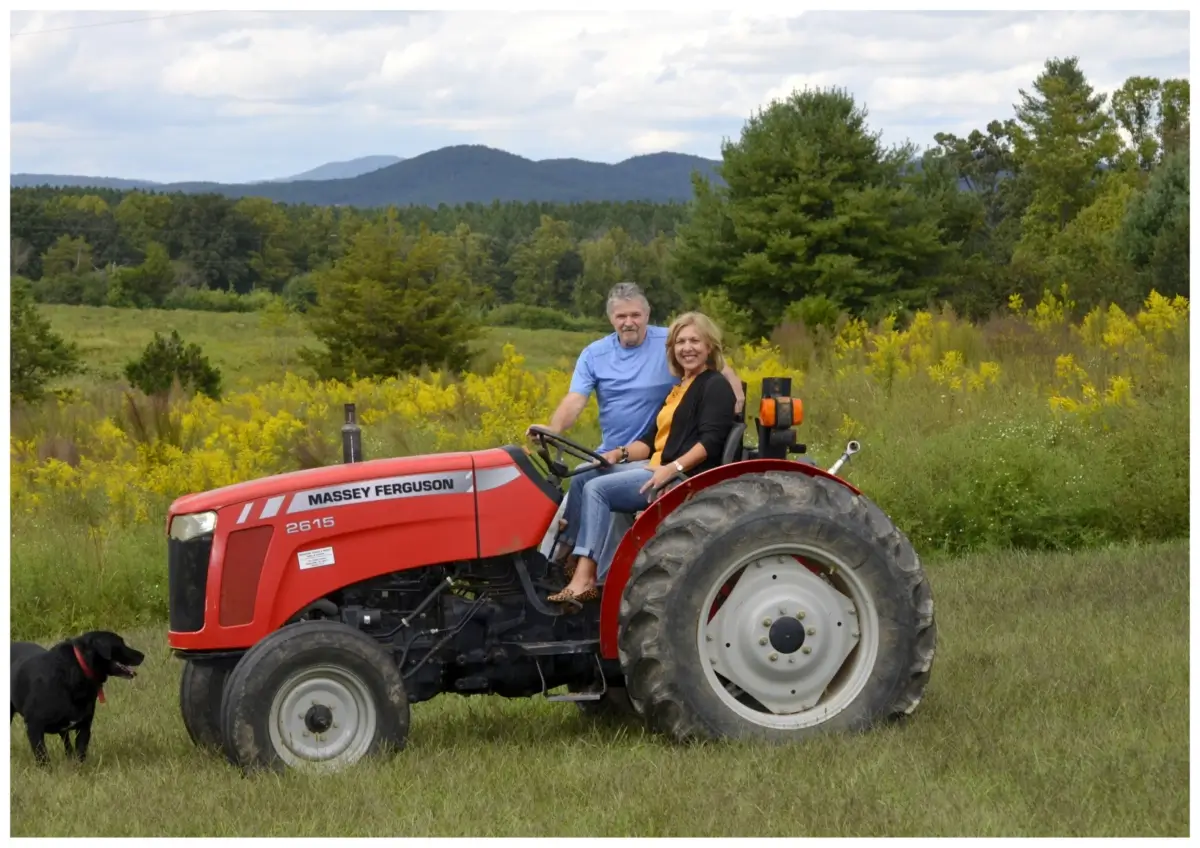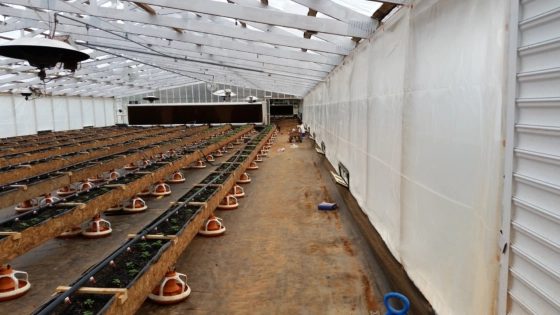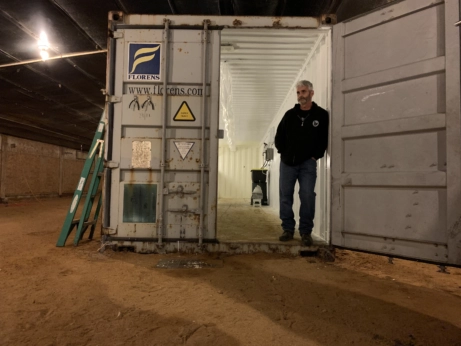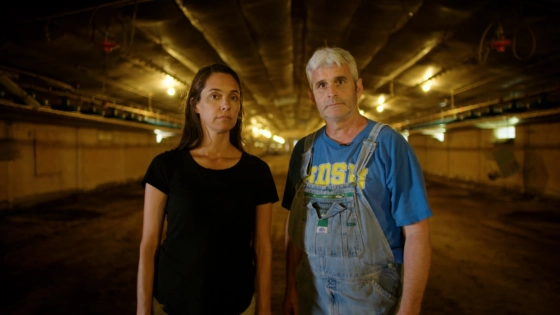They Once Worked in Factory Farming. Not Anymore.
Factory farming is exploitative of farmers. Here’s how some producers have transitioned out of contract farming with the help of organizations that can provide a lifeline.
They Once Worked in Factory Farming. Not Anymore.
Factory farming is exploitative of farmers. Here’s how some producers have transitioned out of contract farming with the help of organizations that can provide a lifeline.

Paula and Dale Boles. by Transfarmation / Mercy For Animals)
When Paula and Dale Boles took over Dale’s father’s farmland in North Carolina, they thought that poultry farming would be a good way to work the land until they were ready to pass it on to their children. They obtained a contract with Case Farms, eventually switching over to Tyson, and built two poultry barns to company specifications, going $300,000 in debt to do so. It seemed like a good situation, though—as long as they could make their annual mortgage payment of $40,000, they’d be able to pay it off within 10 years.
But soon, other expenses started getting tacked on. Tyson required a new computer system to control the temperature in the barns. This was another $70,000. Their propane bill averaged around $25,000 per year. Not making the updates wasn’t really an option—no matter how much time and money you invested to be a farmer for the company, they could cut your contract at any time.
And the income wasn’t quite what they expected. Companies like Tyson pay their farmers in what’s called a tournament system. There’s a base pay, but whoever raises the best flock and has the best “feed conversion”—the biggest birds for the least feed— makes the most money, and payment decreases the further you go down the ladder. This essentially pits all the regional farmers against each other.
Challenging company representatives, even on small things, resulted in retribution. Paula Boles says sometimes they’d intentionally bring you a “bad flock,” keeping your yields low and locking you into the bottom rung of the tournament system.
“If you complain too much, they just start sending you bad flocks of chickens,” she says.
The Boles’ situation with Tyson was far from unique. While contract farming, or “factory farming,” has been exposed in the media for being exploitative of animals, the farmers who sign contracts with companies like Tyson, Perdue or other big players in animal agriculture also find themselves backed into a financial corner. But, over the last several years, there has been a wave of efforts to find ways to support farmers transitioning out of factory farming. The Boles, who raised their last flock for Tyson about nine years ago, are proof that getting out is possible.
“Now to have come through it, it’s been a long process,” says Boles. “It hasn’t been easy, but we’ve lived to tell about it, so to speak.”
Creating pathways
Tyler Whitley is the director of transfarmation for The Transfarmation Project, an initiative of Mercy for Animals. He has helped work with 12 farms to get them out of the industrial system—a system, he says, that is designed to exploit them.
“The way that the current structure of factory farming is designed is that…the steps that carry with it the most risk and the most debt and the most liability are transitioned to the farmers,” he says. “And so what you have is you have farmers building these extremely expensive facilities at the very specific direction [and] design of the company that they’re working for. But they don’t own the animals.”
The Transfarmation Project was founded by Leah Garcés. Whitley says that Garcés realized that ending factory farming would necessitate support systems for the farmers.
“She thought that if we’re going to be able to end factory farming, it’s not just about creating a different system that runs parallel, like you might see a lot of organizations doing when they talk about agroecology or regenerative farming [and] things of that nature,” says Whitley. “But you have to actually create transition paths for farmers to exit out of factory farming.”
And these pathways can be difficult to find and establish. Debt is one of the biggest hurdles to transitioning out of contract farming, says Whitley. And it’s not simply that the farmers have debt but a specific type of debt that requires lender authorization before farmers can make a change.
Two of the other big challenges relate to the question: If not contract farming, then what? If you’re choosing to grow a different crop, a big obstacle is the learning curve—all forms of farming require specialized knowledge that makes changing lanes difficult. The other hurdle is marketing. When you have a contract, you don’t need to market your product, because you only have one buyer. This is also part of what makes factory farming inherently risky for the farmer.
“They don’t market the animals directly, so they have one customer,” says Whitley. “If you’re a business that has only one customer, you have a very high amount of risk for your business if you should lose that customer.”

Before The Transfarmation Project can help farmers find specific buyers for new crops, it needs to have a pretty good idea of what would feasibly bring in an income for the farmer. For this, it turns to Highland Economics for market analyses. Highland Economics has composed reports on a handful of specialty crops of The Transfarmation Project’s choosing, such as hemp, edible flowers, strawberries and microgreens.
The assessments are twofold—it looks at the regional market drivers for a crop, including what types of investments are being made in the sector and important trends—and it also considers what the projected costs and returns of growing that crop are in an indoor setting. Looking at the data that emerges in these analyses, such as consumer demand and the debt service coverage ratio (the ability of a producer to pay their debts with the income they earn) helps farmers decide if a certain crop is right for them.
Travis Greenwalt of Highland Economics also encourages producers to do their own research. “I think this is a great preliminary or a starting point for starting that conversation,” says Greenwalt. “But the specific costs and specific returns are going to be all dependent on the location and the producer.”
‘Steady treadmill of debt’
Garcés started The Transfarmation Project after meeting Craig Watts, a then-poultry farmer for Perdue who let her come to his farm and film inside his chicken barns. This view into what factory farming was really like made national headlines. Watts found himself as a whistleblower after feeling deeply disturbed by the disconnect between how this scale of poultry farming was portrayed versus the reality of the situation. But when he was starting out, his goal was to get back to farming on his family’s land, and contracting with Perdue seemed like the way to do it.
“It just sounded like a good deal,” says Watts. “You build the houses, they supply the birds, they supply all the technical advice. It’s a steady cash income. Supposedly, you could have positive cash flow the first year in business, which was unheard of.”

But Perdue exercised control over how Watts farmed. It could move the goalposts as it desired, requesting upgrades to his equipment for which he had to pay.
“They’re always coming back to you when you get your houses close to being paid for to make these additions or renovations,” says Watts. “There’s always this new thing, ‘it’s gonna save the industry and you have to have it, but we’re not going to make you get it but we’re not gonna bring you any more birds until you do it.’ It’s kind of making it mandatory without actually saying ‘mandatory.’”
Instead of making good money, Watts found himself on a “steady treadmill of debt.”
Additionally, the way that the birds were being treated was misrepresented to the public, which eventually tipped Watts over the edge.
“I guess everybody has their breaking point,” says Watts. “And I had mine sitting in a motel room in Brookings, South Dakota.”
A commercial had come on the television for the company. As Watts watched the commercial, he saw Jim Perdue driving down the road and then stepping into a chicken barn. Inside the barn were big, beautiful, clean birds, walking around on floors covered in pine shavings.
The reality that Watts had witnessed day in and day out for 20 years was quite different: chickens packed into small spaces, often injured or physically unable to stand or walk, panting due to overheating and sitting on a cake of fecal matter.
“I had a contract with Perdue Farms, but at the end of the day, the customer was my boss,” says Watts. “And I just felt like they needed to know.”
And that was how he ended up letting Garcés inside his barns to film. The resulting video made national news in 2014.

Now, Watts works with the Socially Responsible Agriculture Project (SRAP), heading up its Contract Grower Transition Program. At the same time, he is learning how to effectively grow mushrooms on his farm in the old poultry barns. Growing mushrooms requires a very different set of skills, and as he learns best practices, he helps other farmers find a place to land.
Most people who come to SRAP are in crisis mitigation mode; they just had their contracts cut, many are strapped with debt and they’re trying to figure out how to proceed without losing their land and their livelihoods. Every farm is different, so there is not one uniform approach. But SRAP provides guidance through the financial and legal obstacles.
“We are an air traffic controller, so to speak,” he says. “We are looking for that pilot to help them land as soft as possible.”
It’s not without loss, Watts cautions. Changing the way you farm or remaining in farming after a contract is cut isn’t always possible. “People still lose their farms,” says Watts. “There’s no magic wand here. We flip rocks until we can’t flip anymore.”
For Watts, the bigger changes have to be systemic.
“We hear about how the food system is broken,” says Watts. “The consolidation has given farmers less options to sell to and less options to buy from. But the reality is, the food system is working as it was designed to work. It’s working perfectly. What has got to happen is there has to be a major shift in policy.”
Ripple effect
The video Garcés made with Watts made waves in the media, but it also resonated deeply with other farmers who were in the same position and had felt completely isolated. In December 2014, the video made its way to Paula and Dale Boles.
That day, the Boles came home from a difficult day at their barns with a bad flock.
“We went back to the house and watched that, and just sat there in tears,” says Paula Boles. “Because we knew when we saw that, that we weren’t the dumb hillbillies like Tyson had told us that we were. We knew that there was somebody else out there. And everything that [Watts] said in that video was the life that we were living.”
They looked at their calendar and decided that May 2015 would be their last flock. Boles wrote a letter to Tyson requesting to terminate their contract, and four weeks later, they received notice that their cancellation had been accepted.
“Even driving to the post office to pick it up, I was a nervous wreck,” says Boles.
Farms contracting with Tyson have a sign on their property that says “Tyson” and the name of the farm. About a week after their cancellation was confirmed, someone from Tyson drove out to the farm and picked up their sign.
“We were just standing there, we thought, wow—we invested $400,000, we almost lost everything that we have, and all they had invested in us was a $20 sign.”
To learn about what the Boles did next to create a second life for their farm and hear about more organizations that offer support to producers transitioning out of factory farming, read part two.
Follow us
This work is licensed under a Creative Commons Attribution-NoDerivatives 4.0 International License.
Want to republish a Modern Farmer story?
We are happy for Modern Farmer stories to be shared, and encourage you to republish our articles for your audience. When doing so, we ask that you follow these guidelines:
Please credit us and our writers
For the author byline, please use “Author Name, Modern Farmer.” At the top of our stories, if on the web, please include this text and link: “This story was originally published by Modern Farmer.”
Please make sure to include a link back to either our home page or the article URL.
At the bottom of the story, please include the following text:
“Modern Farmer is a nonprofit initiative dedicated to raising awareness and catalyzing action at the intersection of food, agriculture, and society. Read more at <link>Modern Farmer</link>.”
Use our widget
We’d like to be able to track our stories, so we ask that if you republish our content, you do so using our widget (located on the left hand side of the article). The HTML code has a built-in tracker that tells us the data and domain where the story was published, as well as view counts.
Check the image requirements
It’s your responsibility to confirm you're licensed to republish images in our articles. Some images, such as those from commercial providers, don't allow their images to be republished without permission or payment. Copyright terms are generally listed in the image caption and attribution. You are welcome to omit our images or substitute with your own. Charts and interactive graphics follow the same rules.
Don’t change too much. Or, ask us first.
Articles must be republished in their entirety. It’s okay to change references to time (“today” to “yesterday”) or location (“Iowa City, IA” to “here”). But please keep everything else the same.
If you feel strongly that a more material edit needs to be made, get in touch with us at [email protected]. We’re happy to discuss it with the original author, but we must have prior approval for changes before publication.
Special cases
Extracts. You may run the first few lines or paragraphs of the article and then say: “Read the full article at Modern Farmer” with a link back to the original article.
Quotes. You may quote authors provided you include a link back to the article URL.
Translations. These require writer approval. To inquire about translation of a Modern Farmer article, contact us at [email protected]
Signed consent / copyright release forms. These are not required, provided you are following these guidelines.
Print. Articles can be republished in print under these same rules, with the exception that you do not need to include the links.
Tag us
When sharing the story on social media, please tag us using the following: - Twitter (@ModFarm) - Facebook (@ModernFarmerMedia) - Instagram (@modfarm)
Use our content respectfully
Modern Farmer is a nonprofit and as such we share our content for free and in good faith in order to reach new audiences. Respectfully,
No selling ads against our stories. It’s okay to put our stories on pages with ads.
Don’t republish our material wholesale, or automatically; you need to select stories to be republished individually.
You have no rights to sell, license, syndicate, or otherwise represent yourself as the authorized owner of our material to any third parties. This means that you cannot actively publish or submit our work for syndication to third party platforms or apps like Apple News or Google News. We understand that publishers cannot fully control when certain third parties automatically summarize or crawl content from publishers’ own sites.
Keep in touch
We want to hear from you if you love Modern Farmer content, have a collaboration idea, or anything else to share. As a nonprofit outlet, we work in service of our community and are always open to comments, feedback, and ideas. Contact us at [email protected].by Lena Beck, Modern Farmer
May 7, 2024
Modern Farmer Weekly
Solutions Hub
Innovations, ideas and inspiration. Actionable solutions for a resilient food system.
ExploreExplore other topics
Share With Us
We want to hear from Modern Farmer readers who have thoughtful commentary, actionable solutions, or helpful ideas to share.
SubmitNecessary cookies are absolutely essential for the website to function properly. This category only includes cookies that ensures basic functionalities and security features of the website. These cookies do not store any personal information.
Any cookies that may not be particularly necessary for the website to function and are used specifically to collect user personal data via analytics, ads, other embedded contents are termed as non-necessary cookies.
Wow! Factory farming sounds like indentured servitude! What a slave racket. Externalize the costs and privatize the profits. It truly operates on perverse incentives!
We produce Timbrchar from trees killed by beetles or ashborers. During this process we produce carbon credits. Using our char in a poultry operation can exponentially reduce the odor, reduce bird mortality by up to 80% and it will kill beetle infestations. We are looking for farms to work with and would like to ultimately have an article on the results. Perhaps you might be able to direct us? I love your publication and have forwarded it to many others.
Loved reading this story! My folks live in NW Arkansas near where Tyson has its headquarters, and I see (and smell) these contract chicken farms everywhere. Investigate Midwest also ran a story this month looking at the farmers who are burdened with debt after Tyson ended their contracts without warning. A great companion piece next to all three of your stories. Keep up the great work!